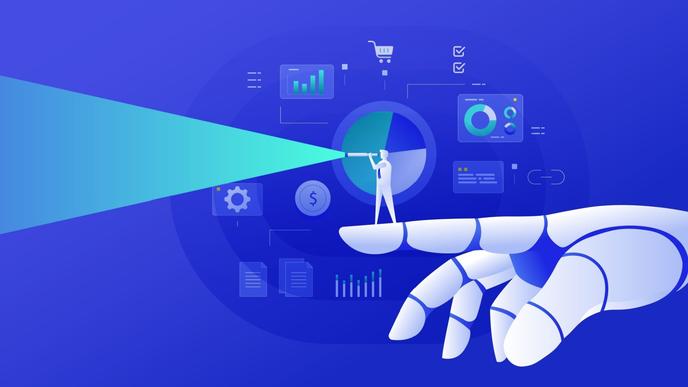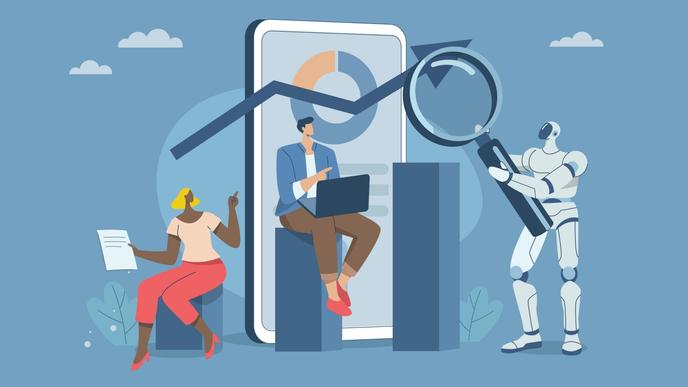The Finances of the Future: How to Manage Money Through Technology
Just a decade ago, financial literacy was mostly about knowing how to save money, keep a household ledger, avoid debt, or at least pay it off on time.

Today, our financial habits-like other areas of life-have transformed. They've become digital, mobile, and flexible. We pay for purchases with a tap of a phone, invest through apps, and monitor currency rates in real time. But along with convenience comes a new kind of responsibility: the ability to understand technology, assess risks, and maintain financial awareness in a world where money is no longer something tangible.
Financial Literacy Today

In the digital age, financial literacy implies complex thinking-from understanding how the banking system works to mastering the skill of managing personal capital through apps, artificial intelligence, and investment platforms.
The modern person makes dozens of financial decisions daily, often without even noticing. A streaming subscription, automatic payment for cloud storage, a micro-purchase in an online game-all of these are elements of our new financial ecosystem. Losing control over these flows is the very reason behind hidden budget leaks. Financial literacy helps reveal these connections and regain control.
Moreover, technological progress has, on the one hand, simplified financial operations, but on the other-algorithms now create personalized offers, marketplaces encourage impulsive spending, and cryptocurrencies and tokens give an illusion of easy money. It's essential to distinguish between innovation and illusion.
Literacy is the ability to ask questions: "Where does the yield come from? How are my data protected? What fees am I paying for convenience?" In our age, a financially literate person is not just someone who can balance a budget, but someone who understands how the digital economy works.
Digital Wallets and Investments: A New Ecosystem of Money Management

Digital wallets have evolved beyond being a simple payment tool-they've become the center of personal finance. They unite accounts, cards, bonuses, and subscriptions, allowing users to analyze spending down to the last cent.
Apps like Revolut, Monobank, or Apple Pay have turned into personal financial assistants. They don't just display your balance-they advise users on when it's best to pay a bill, how to allocate expenses, and which cashback option to activate. This is no longer mere automation-it's financial mindfulness through an interface.
Digital wallets turn complex financial actions into simple, intuitive scenarios:
-
"I want to save for a vacation" - the system calculates how much to set aside each week.
-
"I'm paying too much for subscriptions" - the algorithm detects duplicates and suggests canceling unnecessary ones.
-
"I need to pay my taxes" - the app reminds you of deadlines and automatically generates payment details.
Beyond that, digital wallets are becoming a bridge between everyday money and investments. In a single interface, you can not only pay bills but also buy stocks, funds, bonds, ETFs, and sometimes even cryptocurrency.
Investing has therefore become much simpler and more democratic. In the past, entering the market required understanding complex terminology and having access to a broker. Now, a smartphone is enough. Apps like Interactive Brokers or Robinhood have made investing a part of everyday life.
Yet it's important to remember: accessibility does not equal safety. Algorithms can simplify the process of buying stocks, but they don't relieve you of responsibility for strategic decisions. Financial literacy here is not about "catching the trend," but about understanding the balance between risk and return, seeing the long-term goal, and not confusing investment with speculation.
Budgeting with AI: Neural Networks as Financial Navigators

Neural networks are becoming new allies in personal finance management. They analyze expenses, forecast income, and suggest optimal behavioral models. What once required spreadsheets and graphs can now be delegated to a digital assistant.
How to use AI in financial planning:
-
Expense analysis. AI-powered apps like Cleo, Copilot, or Money Manager analyze spending by category and identify patterns. For example, they might notice that you spend more on food delivery at the end of the month and suggest changing that habit.
-
Budget forecasting. Neural networks can model scenarios: what happens to your balance if you start saving 10% of your income or cut back on subscription spending. This helps visualize the future and make decisions not intuitively, but consciously.
-
Automatic saving. Some banks already use AI algorithms for "smart savings": the system analyzes your financial activity and transfers small sums to a savings account without affecting your daily comfort.
-
Financial motivation. Artificial intelligence can turn saving money into a game. Apps award "achievements" for hitting financial goals or for going a week without impulsive purchases. This makes learning financial discipline less tedious and more engaging.
Lectera’s Online Courses by topic
Cryptocurrencies and Digital Assets: The Finance of the Future or the New Normal Today

For a long time, cryptocurrencies were seen as an exotic domain-an arena for enthusiasts and investors ready to take big risks. Today, they've become a full-fledged part of the global financial system. Digital assets are now tools of diversification, stores of value, and even means of international transactions.
However, as popularity grows, so do the risks-volatility, lack of regulation, and cybersecurity threats. Understanding blockchain technology, decentralization principles, and crypto wallets has become part of the basic education for anyone who wants to feel confident in the world of Web3.
What to know about the crypto-finance of the future:
-
Security comes first. A private key is your personal signature. Losing access to it equals losing your funds. Therefore, proper storage-cold wallets, two-factor authentication-is the first essential skill for any crypto user.
-
Regulation is gaining momentum. Governments are developing frameworks for digital currencies and tokens. This reduces chaos but requires investors to read legal documents and understand tax implications.
-
Tokenization of assets. The future of finance lies in the idea that everything-from real estate to works of art-can exist in digital form. This opens access to investments previously unreachable for individuals but requires a new culture of ownership.
-
Central Bank Digital Currencies (CBDCs). State-backed digital currencies-such as the digital yuan, euro, and ruble-are already being tested. They combine the advantages of crypto technologies with the reliability of traditional finance.
The world is moving toward a model in which money is no longer just a medium of exchange but part of our digital identity.
The financial literacy of the future is not only the ability to manage an account but also the understanding of how data, technology, and trust shape the new economy.
In the digital age-when every tap on a screen is a financial action, algorithms advise us where to invest, AI plans our budgets, and cryptocurrencies erase borders between countries-it's crucial to remember: technology is only a tool. It cannot replace your strategic thinking. The smarter algorithms become, the greater the value of soft skills-critical thinking, discipline, and responsibility.
Share this with your friends via:
Latest News

A significant stage in the development of the alternative education system has begun in West Northamptonshire in the UK: the County Council is actively calling on parents, guardians, and trustees to participate in shaping the future of this key area.

Outwoods Primary School in Atherstone, Warwickshire, having experienced deep sadness after the loss of their famous cat, Silla, has found solace in a new pet – a Maine Coon named Aloysius O’Hara.

In modern universities, artificial intelligence, and in particular ChatGPT, is rapidly transforming from a controversial tool into a full-fledged student assistant.

An innovative educational project is gaining momentum in UK primary schools, aiming to change attitudes towards video games.

The Massachusetts Institute of Technology (MIT) presents MIT Learn – a revolutionary online platform that opens a “new front door” to access university knowledge and resources.












 “I’m Here for the Long Haul”: When Loyalty to a Company Becomes Toxic
“I’m Here for the Long Haul”: When Loyalty to a Company Becomes Toxic
 Freelancing, Remote Work, Office Jobs, or Consulting: How to Choose the Work Format That’s Right for You
Freelancing, Remote Work, Office Jobs, or Consulting: How to Choose the Work Format That’s Right for You
 Test: How Prone Are You to Abusive Behavior as a Manager?
Test: How Prone Are You to Abusive Behavior as a Manager?
 Test. What superpower would you possess if you were a superhero?
Test. What superpower would you possess if you were a superhero?
 Test. What Should You Let Go of Before Winter Ends?
Test. What Should You Let Go of Before Winter Ends?
 Test. Which Ritual Should You Start Practicing This Winter?
Test. Which Ritual Should You Start Practicing This Winter?
